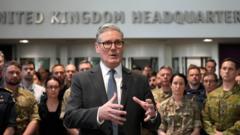Steve Witkoff, a special envoy for Donald Trump, has dismissed UK Labour leader Keir Starmer's proposal for an international military force aimed at fostering a ceasefire in Ukraine, referring to it as merely "a posture and a pose." In a recent interview with Tucker Carlson, Witkoff criticized Starmer's perspective and those of other European leaders, suggesting they were trying to emulate the legacy of Winston Churchill without grasping the real complexities of the situation.
Witkoff, who met with Vladimir Putin just days ago, expressed a sense of admiration for the Russian leader, describing him as "gracious" and "straight up." During his discussions with Carlson, Witkoff reiterated several Russian arguments, claiming that Ukraine is "a false country" and questioned when the global community would recognize Russian control over occupied territories.
Witkoff is currently leading ceasefire negotiations involving both Russia and Ukraine, but he appeared unclear on vital details, struggling to name the five Ukrainian regions that have been subject to Russian annexation or partial occupation. He acknowledged "Donbas" and "Crimea" while missing Luhansk, Donetsk, Kherson, and Zaporizhzhia.
Moreover, Witkoff made controversial statements, including claims about Ukrainian troops being encircled in Kursk, which were disputed by Ukrainian officials. He also stated that referendums in the occupied regions showed overwhelming support for Russian governance, despite widespread criticism regarding the legitimacy of those votes.
As the U.S. prepares for further talks in Saudi Arabia focusing on a ceasefire, recent escalations have emerged in Ukraine. Russian drone strikes on Kyiv resulted in several fatalities, including those of a child, with additional casualties reported in Zaporizhzhia. Witkoff reiterated that a ceasefire is imminent in the Black Sea and that the U.S. is close to achieving a comprehensive 30-day truce.
In the context of Starmer's proposed "coalition of the willing," Witkoff described the initiative as overly simplistic and unrealistic, arguing that it misunderstands the contemporary security landscape in Europe. He contended that concerns of a Russian march across Europe were exaggerated, citing NATO as a stabilizing force absent during World War II.
Witkoff also reflected on Trump's approach to future relations with Russia, suggesting that cooperation in energy policy and artificial intelligence is desirable. He concluded that the real issues at the heart of the conflict involve territorial and historical claims that have deep roots, underscoring the complex nature of contemporary geopolitical tensions.





















